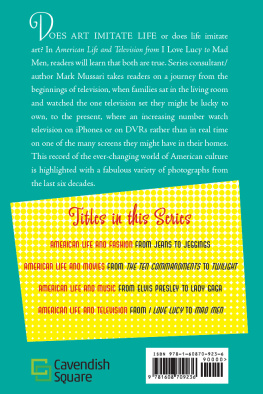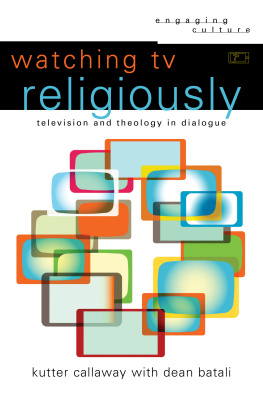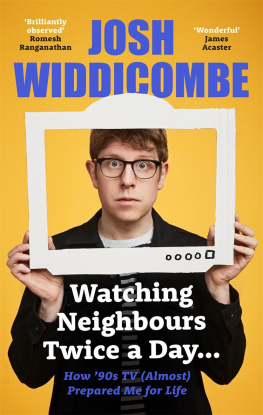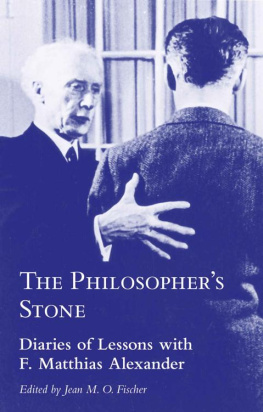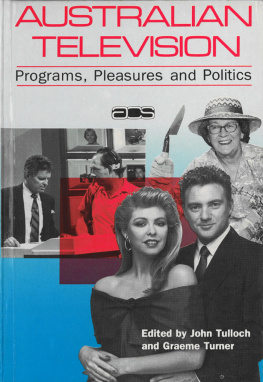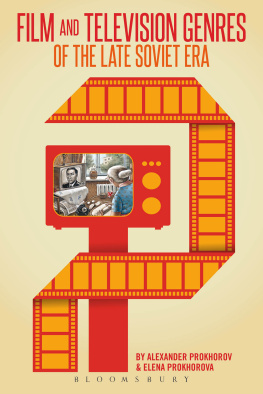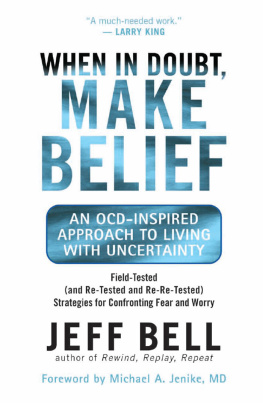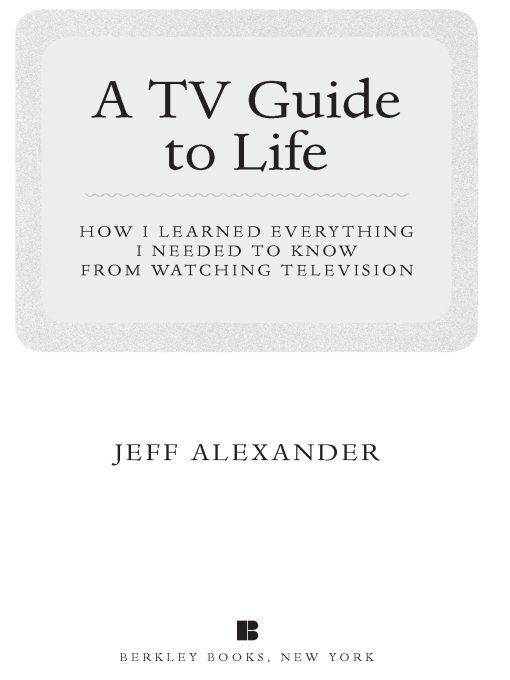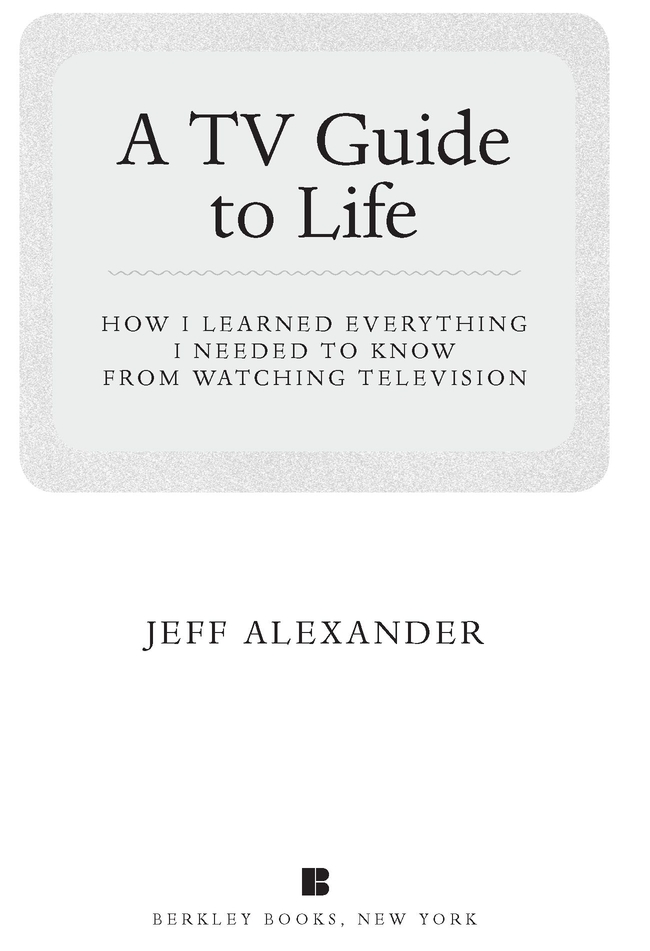Table of Contents
Most Berkley books are available at special quantity discounts for bulk purchases for sales promotions, premiums, fund-raising, or educational use. Special books, or book excerpts, can also be created to fit specific needs.
For details, write: Special Markets, The Berkley Publishing Group, 375 Hudson Street, New York, New York 10014.
For Lora and Max
Introduction
If they are right, and this instrument is good for nothing but to entertain, amuse and insulate, then the tube is flickering now and we will soon see that the whole struggle is lost. This instrument can teach, it can illuminate; yes, and it can even inspire. But it can do so only to the extent that humans are determined to use it to those ends.
David Strathairn as Edward R. Murrow in
Good Night, and Good Luck
Aired on TV at some point
Remember what your parents used to say to you about watching too much television? The exact words? Of course you dont, because they werent spoken by famous actors in a funny way. But the gist was probably that it would rot your brain.
So is it true? Does television really rot your brain? I think not. Ive been watching television my whole life, and cataloging all the things Ive learned at the cathode ray teat would be a Herculean task. But with this book, Im going to try. Perhaps now youre challenging me to name one thing that television has actually taught me. Well, I can tell you the first thing I learned from TV. I was three years old when television taught me how to read.
Ever since the crash-course trifecta of Sesame Street, Mr. Rogers Neighborhood, and The Electric Company ushered me into literacy, television has taught me everything I need to know, from vital facts about physics and the world we live in, to the truth about interpersonal relationships between coworkers, relatives, friends, and lovers.
(Wait, I exaggerate. There was about a year and a half when I didnt own a TV. During that period I was underemployed, poor, depressed, and not getting any smarter.)
Not all that long ago, there wasnt any TV at all, and the way most people had to learn about the world was by becoming apprenticed to a tradesman or artisan at an early age. This form of indentured servitude was ideal for teaching the next generation of silversmiths, coopers, cobblers, and what have you such valuable skills as making silver, barrels, shoes, and what have you (not to mention exactly how the previous generation of silversmiths, coopers, cobblers, and what have you took their breakfasts). But it taught them nothing about the wider world, things they might have needed to know if they were ever called upon to, say, marry women completely out of their league, or operate a defibrillator, or determine whether a person of their acquaintance was an evil robot. Fortunately, we now have a more wide-ranging, comprehensive, and generally accessible system for disseminating general knowledge, and its initials are T and V.
Keep in mind, Im not just talking about whats known as educational TV. Of course its no secret that theres a great deal to be learned from public television, not to mention cable channels further up the dial that have words like Health and Discovery and History and Geographic and Food right in their names. Gleaning lessons from those channels doesnt take any work at all. They sound like a junior high schedule, for Petes sake.
Therefore, I plan to avoid the educational genre almost altogether in this book. So no learning programming (too didactic), talk shows (too dry), soap operas (too slow), cooking shows (how do you know if yours tastes right?), or reality TV (those people are fucking insane). And yes, you could probably pick up a lot from watching the news, but these shows tend to assume that you come to the table with a lot of preexisting knowledge, like who the current President of the United States is and so forth. Since that job changes hands at least once on any given season of 24, its kind of a lot to keep track of.
Consider instead the shows that have been entertaining, amusing, and insulating (to use Murrows downerish words) for the last half century or more. Murrow (or at least David Strathairn) said that learning from television is only possible if were determined to use it to those ends. Not even a game show can compare to the rate at which fictional, scripted television is able to scoop knowledge into your skullif thats what you want it to do. And what shows more determination than resolv-ingto master physics by watching episode after episode of The Dukes of Hazzard?
Some philosopher or another (Ill tell you which one as soon as somebody makes a TV series about him) posited that in theory, its possible to sit alone in a dark cave for your whole life and accurately deduce everything about the world, humanity, and the nature of existence itself. And maybe it is. But it would probably go a lot more quickly and be loads more entertaining if you had a fifty-two-inch plasma in there with you.
So what if television isnt always an accurate reflection of reality? That doesnt mean it cant teach us things (besides what stuff to buy, I mean). Yes, television has certain limitations, but then so does any other art form. Painting, music, theater, writing, dance, scrapbookingthey all have their specific vocabulary, shorthand, and conventions. And if youve ever been to a Star Trek convention, you know what Im talking about.
Im not going to lie to you. In the University of Television, with hundreds of channels going 24/7, and some channels going back over fifty years (even though it was more like 12/6 back then), Ive skipped a lot of class. Theres just no way to have seen it all, even with reruns. But over a lifetime in front of the tube, Ive been able to synthesize certain themes and ideas that have stood the test of time. The bottom line is that televisionregular, noneducational, prime-time TVcan pretty much teach you all you really need to know to get by in the world.
And if we impose certain subject-matter limitations on ourselves for the upcoming lessons, well notice that it leaves a much lower percentage of total airtime than there used to be. First-run dramas and comedies are being slowly replaced by reality programming and prime-time game shows. Reruns are becoming a thing of the pastnot only in prime time, when the networks trot out crappy summer replacement series and more reality showsbut during the day, when the spots that used to be devoted to reruns of Barney Miller and Bewitched have been given over to talk shows, infomercials, and fake courtrooms presided over by madpeople. In short, airtime is running out, and weve got to learn from TV scriptwriters while theyre still around. After all, people thought the apprenticeship model would be around forever, and even the Donald Trump version of that is just about on its last legs now.
Even so, learning about the world from television is like drinking from a fire hose. You need someone to organize it all, to guide you through the confusing flood of knowledge that pours into your house every time you hit your remotes on button. Thats where I come in.
Im thinking of an episode of the 1990s CBS series Northern Exposure, which chronicled the travails of a young doctor working off his medical school debts in a small Alaskan town. Remember Ed, the feckless young Inuit who spent all his time watching old movies? Remember how an arcane ceremony revealed that he was destined to be a shaman? But Ed had no grounding in the Native American myths and traditions that a true shaman needs to be successful, and he felt completely in over his head. But then he realized: movies had already taught him everything he needed to know to assist his spiritual charges. With


